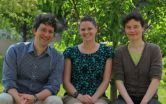(Press-News.org) A new study, published today in the Journal of Health Psychology, found that patients who gained weight 18 months after taking Orlistat attributed their weight-loss failure either to the side effects which have prevented them from sticking to the medication or felt that the medication simply had not worked.
The team from the University of Surrey also found that participants described a series of barriers to weight loss including psychological and physical health issues, relationships and the make-up of their bodies. They also described a number of alternative methods of weight loss that had also failed, and the failure of Orlistat was included within this idea of permanent and ongoing failure.
Orlistat is currently the only prescribed drug for obesity and functions by reducing the amount of fat absorbed from food eaten.
"Our results have significant implications for GPs and how they should communicate with the patients about this drug," said lead author Dr Amelia Hollywood from the University of Surrey.
"GPs can improve patient support while taking Orlistat. At present, the so called "side effects" of Orlistat are seen as unpleasant and intrusive. If health professionals can highlight that such "side effects" are actually the consequences of eating high-fat foods while taking the drug, it could help ensure a change in diets.
"In addition, by alerting patients to these consequences and emphasising the need for dietary change, patients may be in a better position to make an informed judgement as to whether they wish to be prescribed this medication. GPs may likewise be able to make a more informed decision as to whether the medication should be prescribed, which could have cost implications for the NHS by reducing the waste of medications."
INFORMATION: END
Obesity drug failing patients due to lack of education about side-effects
2014-05-08
ELSE PRESS RELEASES FROM THIS DATE:
Urine test best detects alcohol use in liver transplant candidates, recipients
2014-05-08
Researchers from Italy confirm that urinary ethyl glucuronide (uEtG) accurately detects alcohol consumption in liver transplant candidates and recipients. The study published in Liver Transplantation, a journal of the American Association for the Study of Liver Diseases and the International Liver Transplantation Society, suggests that a combination of uEtG and the Alcohol Use Disorders Identification Test for alcohol consumption (AUDIT-c) are best in alerting doctors to alcohol consumption by patients undergoing evaluation for liver transplantation or who have received ...
Breakthrough made at Max F. Perutz Laboratories
2014-05-08
Researchers at the Max F. Perutz Laboratories (MFPL) of the University of Vienna and the Medical University of Vienna made a breakthrough for the Platynereis model system, as they describe the first method for generating specific and inheritable mutations in the species. The method, in combination with other tools, now places this marine bristle worm in an excellent position to advance research at the frontiers of neurobiology, chronobiology, evolutionary developmental biology and marine biology. The study and a review on Platynereis dumerilii genetic methods were chosen ...
Fungus may help stop invasive spread of tree-of-heaven
2014-05-08
A naturally occurring fungus might help curb the spread of an invasive tree species that is threatening forests in most of the United States, according to researchers.
Researchers tested the fungus -- Verticillium nonalfalfae -- by injecting it into tree-of-heaven, or Ailanthus, plots, according to Matthew Kasson, who recently received his doctorate in plant pathology and environmental microbiology from Penn State. The treatment completely eradicated the tree-of-heaven plants in those forests.
"It appears that this treatment is effective in Pennsylvania and could ...
New paper provides important insights into carcinoma-associated fibroblasts
2014-05-08
A new paper by a team of researchers led by Zachary T. Schafer, Coleman Assistant Professor of Cancer Biology in the Department of Biological Sciences at the University of Notre Dame, offers important new insights into the role carcinoma-associated fibroblasts (CAFs) play in tumor biology. A number of recent studies have revealed CAFs to be a major contributor to tumor progression through a variety of mechanisms. Despite this information, the precise role CAFs play in augmenting the growth of tumors is still poorly understood.
In their new paper, Schafer and his fellow ...
'Teenage' songbirds experience high mortality due to many causes, MU study finds
2014-05-08
Nearly one-third of songbird species across North America are experiencing long-term declines. Scientists have spent years researching potential causes for these population declines, focusing on the birds when they have just hatched as well as when they are adults. Now, researchers from the University of Missouri and the U.S. Department of Agriculture have found that songbirds are vulnerable to environmental dangers particularly when they are juveniles, shortly after they have left their parents' nests. Frank Thompson, a scientist with the USDA Forest Service and an associate ...
Hepatitis C virus: How viral proteins interact in human cells
2014-05-08
Viruses use human cells in order to multiply and spread. This process involves interactions with cellular host factors as well as virus-virus interactions. For example interactions among viral proteins are essential for the assembly of newly produced infectious virions.
Interaction network explains viral mechanisms and opens up possibilities for new treatments
Hepatitis C virus (HCV) forms a precursor protein, which is processed into ten viral proteins. Scientists at the Institute of Virology at the Helmholtz Zentrum have now discovered how these proteins interact with ...
Promising role for interleukin-10 in scarless wound healing
2014-05-08
New Rochelle, NY, May 8, 2014—The powerful anti-inflammatory compound interleukin-10 (IL-10) plays a crucial role in regenerative, scarless healing of fetal skin. Studies of IL-10 in postnatal skin wounds have demonstrated its promise as an anti-scarring therapeutic agent, as described in a Critical Review article published in Advances in Wound Care, a monthly peer-reviewed journal from Mary Ann Liebert, Inc., publishers and an Official Journal of the Wound Healing Society. The article is available free on the Advances in Wound Care website.
In "Regenerative Wound Healing: ...
Detecting trace amounts of explosives with light
2014-05-08
University of Adelaide research may help in the fight against terrorism with the creation of a sensor that can detect tiny quantities of explosives with the use of light and special glass fibres.
Published in the journal Sensors and Actuators B: Chemical, the researchers describe a novel optical fibre sensor which can detect explosives in concentrations as low as 6.3 ppm (parts per million). It requires an analysis time of only a few minutes.
"Traditionally explosives detection has involved looking for metals that encase them such as in land mines," says project leader ...
'Parent' cells reset the cell division clock
2014-05-08
Melbourne researchers have overturned a 40-year-old theory on when and how cells divide, showing that 'parent' cells program a cell division time for their offspring that is different from their own.
Scientists from the Walter and Eliza Hall Institute have shown that both phases of the cell cycle contribute to the overall change in division time rather than one staying fixed in duration as previously thought. They have developed these findings into a new model that helps scientists predict how a population of cells has divided.
Their research could impact our understanding ...
Low-carbohydrate diet reduced inflammation
2014-05-08
A low-carbohydrate diet, but not a low-fat diet, reduces inflammation in patients with type 2 diabetes, according to research at Linköping University in Sweden.
It is known that patients with type 2 diabetes have higher levels of inflammation than those who do not have the disease, and it is believed that this may contribute to a higher risk of cardiovascular disease and other complications. In a clinical trial at Linköping University a low-carbohydrate diet was compared with a traditional low-fat diet in 61 patients with type 2 diabetes. Only patients in the low-carbohydrate ...



